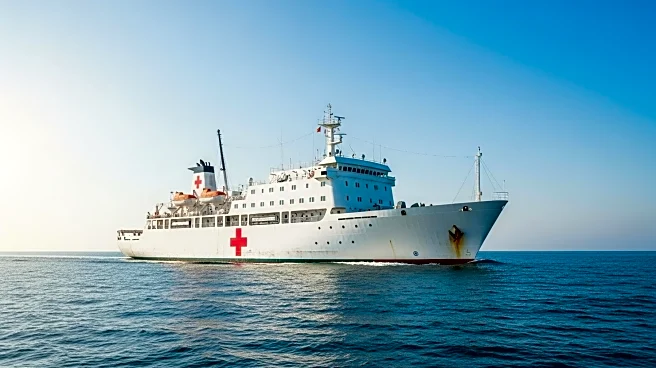What's Happening?
China has been deploying its naval hospital ships globally as part of humanitarian missions, known as Harmony, since 2010. These missions are part of China's efforts to assert its influence worldwide through noncombat activities. The Chinese navy, which is the largest in the world by hull count, operates three oceangoing hospital ships: CNS Peace Ark, CNS Silk Road Ark, and CNS Auspicious Ark. These ships provide medical care to civilians during peacetime and to injured troops during wartime. The Harmony missions have expanded over the years, reaching destinations in Southeast Asia, South Asia, Africa, the South Pacific, and the Americas. The current mission, Harmony 2025, involves the Silk Road Ark visiting countries in the South Pacific and Latin America, marking its first overseas mission.
Why It's Important?
The expansion of China's hospital ship missions is significant as it reflects China's strategic use of humanitarian aid to enhance its global image and diplomatic influence. These missions allow China to strengthen its military operational capabilities while simultaneously supporting its broader diplomatic agenda. By providing medical aid and disaster relief, China is able to foster goodwill and build relationships with countries across various regions. This approach aligns with President Xi Jinping's Global Security Initiative, which aims to reform the world order dominated by Western powers. The missions also highlight China's growing presence in regions where the U.S. has traditionally maintained influence, potentially shifting geopolitical dynamics.
What's Next?
The Silk Road Ark is scheduled to continue its mission by visiting Latin America, a region where the U.S. military has a strong presence. This move could lead to increased tensions between China and the U.S., especially in areas like Venezuela where geopolitical interests are contested. As China continues to expand its humanitarian missions, it may face scrutiny and diplomatic challenges from countries wary of its growing influence. The ongoing mission will likely be closely monitored by international observers to assess its impact on regional stability and diplomatic relations.
Beyond the Headlines
China's use of hospital ships for humanitarian missions raises ethical and strategic questions about the role of military assets in noncombat activities. While these missions provide essential medical services, they also serve as a tool for soft power, allowing China to project influence without direct military engagement. This strategy could lead to long-term shifts in how countries perceive military diplomacy and humanitarian aid, potentially setting a precedent for other nations to follow. The missions also underscore the importance of healthcare diplomacy in international relations, highlighting how medical aid can be leveraged for strategic purposes.











